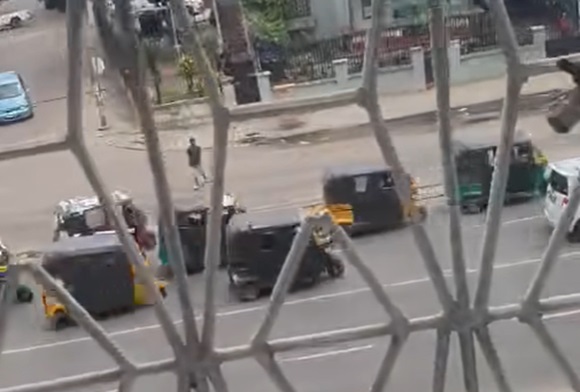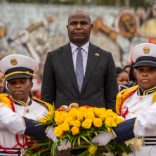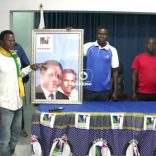Mozambique: President appoints Carlos Mondlane as Judge Counsellor of the Supreme Court
CIP Mozambique Elections: General Strike maintains its noisy momentum; Txopelas show a gentler side

Image: CIP
- General Strike maintains its noisy momentum
The most recent three days of the general strike – Wednesday-Friday 13-15 November – maintained its momentum in the big cities – Maputo, Matola, Beira and Nampula – and at the country’s largest border post – Ressano Garcia.
Soldiers have been brought in but have not been used against demonstrators and at Ressano Garcia were filmed singing with protestors. Police appear to have no central instructions and are taking local decisions. There were two processions this morning (Saturday 16 November) in Maputo. Doctors marched down Av Eduardo Mondlane peacefully and were not disrupted. Teachers tried to march down nearby Av 24 de Julho and were tear-gassed and their leaders arrested.
The main type of demonstration is the “panelaço” – making noise banging metal pots and pans. This started early in the general strike with people nervous to go onto the street making deciding to make noise in their own flats, typically between 9 and 10 pm. But it soon became very loud on the street with the addition of drums, horns, vuvuzelas and car horns. And it spread to very noisy local marches. Venancio Mondlane in his daily Facebook presentations has put the 9 to 10 pm daily panelaços at the top of his instructions.
The impact is, in part, that Frelimo leaders are hearing the deafening protests from their neighbours in the Maputo “cement city” and exclusive neighbourhoods such as Triunfo. Three videos show a panelaço in Triunfo, another in the Maputo cement city, and another with a soldier or police person banging a pan with their rifle.
But the other part of youth action has been blocking roads with burning tyres, timber and rubbish. Combined with marches and police action, that has largely disrupted the Maputo-Matola economy during strike days. Many shops are closed and there is limited public transport. This is enforcing the general strike.
Txopelas show a gentler side
There is also a sense of fun on the side of the protestors, despite the risk. On 14 November drivers of 30 txopelas (tuk-tuks, 3 wheel taxis) sounding their horns drove slowly down the Maputo main road, Av Eduardo Mondlane, with Venancio Mondlane stickers on their wind screens. They were tear-gassed by the police, but a policewoman was overcome with the gas, so the txopelas took her to hospital.

from video, below.
Avenida Eduardo Mondlane – Cidade Maputo
Txopelistas são lançados com gás LACRIMOGÉNEO fazendo greve pacífica…🚨 pic.twitter.com/mIc2vPUzik— POVO NO PODER 🇲🇿 (@JerThaPlug) November 14, 2024

- Ghosts go to the big match
Mozambique played Mali at Zimpeto stadium in Maputo yesterday (Friday) in an African Cup of Nations qualifying match. Mozambican officials hoped to use the match to show Maputo was normal and they gave thousands of tickets to supporters. But pictures from the state TVM showed what appeared to be an almost empty stadium. Perhaps it was really full, but the tickets had been given to Frelimo ghost voters. Or, perhaps some TVM staff wanted to show the reality.

Venancio Mondlane supporters also took some tickets, and used their position to boo the police and cheer Mondlane. Mali beat Mozambique 1-0.
- Protests close Ressano Garcia for 3 days
Ressano Garcia is Mozambique’s biggest land border crossing. Traffic volumes reach 1600 heavy trucks per day and 30 million tons of freight per year, most of it ferrochrome travelling by road from South Africa to Maputo port. But much of Maputo’s food and consumer goods also pass that way.
On 5 November customs and border officials shot a demonstrator. Local people reacted in anger, and trashed the border post. What had been a few demonstrators grew to several hundred, and for the three day 13-15 November general strike they simply took over and closed the border.
The closure was not total. AIM (15 Nov) reports that pedestrians were allowed through and from 03.00 to 12.00 on Thursday the border was open to trucks carrying goods for the Mozambican market.
There was no attempt at police intervention. But as AIM’s Paul Fauvet pointed out “The demonstrators warned that if the police used force to clear the road, the demonstrators would set fire to the Ressano Garcia power station, to the local police stations and to other institutions in the border area. Astonishingly, the government has not provided sufficient security to ensure protection for the power station.”
The article below is from a local TV reporter.
“Today I was in Ressano, in fact… in the autonomous republic of Ressano Garcia.
By: Stélio Biriba, TVSucesso
Today I was in Ressano Garcia on a journalistic assignment because of the demonstrations that have been taking place for over a month all over the country. It’s incredible the unity and determination of those people who swear with their feet that they no longer want Frelimo to lead the country. In fact, it wasn’t easy to work in Ressano, the population wants nothing more than alternation of power, and electoral justice as a result of the vote on 9 October. When we went to Ressano, the population said that the only way they would let us work was if we showed the whole atmosphere at that moment, filmed everything and without censorship, and we said yes, that was why we were there, to report on the situation in Ressano. After the dialogue and subsequent understanding, we were given the go-ahead by the locals to work. During the work, there was something that caught my attention during the report, it was exactly at this moment in the video, when I realised I was already under the protection of the demonstrators, they were following me around the clock, accompanying me everywhere and not even allowing me to jeopardise my physical integrity. I confess, I’ve never felt so loved and protected by the people, it was indescribable and surreal.
Chanting, holding signs and placards, Ressano vented its frustration in his own way, saying that ‘the people are tired’. The military, almost all of them, joined the demonstrators at some point, raised their arms, waved and shared the same space peaceably. … The atmosphere was a kind of ‘together and mixed’, despite scenes of some agitation and violence led by the police.
In Ressano, the people dictate their own laws, the road leading to the border is blocked off, along it, plastic tables and chairs, beer and water on the table, music in the stalls and a super-talented DJ. … While I was recording and walking, the laces of my black trainers came undone, a young woman appeared, leaned over and tied them again, in the euphoria of the moment, I couldn’t see her face, the only thing I can tell is that she was wearing a white dress.
In the midst of the calamitous scenario in Ressano, my most sincere thanks go to the people and especially to the two young men who escorted me during the report.”












Leave a Reply
Be the First to Comment!
You must be logged in to post a comment.
You must be logged in to post a comment.